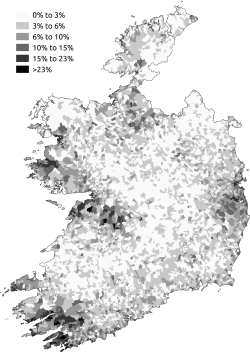
Irreligion in Ireland pertains to the population of Ireland that are atheist, agnostic, or otherwise unaffiliated with any religion. The 2022 census recorded that 14% of the population was irreligious; the second largest category after Roman Catholicism.[1] The population was traditionally devoutly Catholic throughout much of Ireland's modern history,[2] with a peak of 94.9% identifying as Catholic in the 1961 census. This percentage has declined to 69% in the 2022 census, the lowest recorded. Conversely, those with no religion made up less than 0.1% of the population in 1961;[3] the proportion grew slowly until the 1991 census where it began to rapidly increase[4] to its current share of 14% of the population in 2022.
Church attendance has also rapidly declined in Ireland.[5] A study by the World Inequality Database (WID) of Irish political and social attitude surveys found that the share of Irish adults who attended church regularly (monthly or more) declined from 80% in the 1990s to 28% in 2020.[6][7]
In 2012, Ireland ranked in the Top 10 Atheist Populations in a survey which questioned 50,000 people from 57 countries.[8][9][10] As of 2018, Ireland was ranked 115th by the International Humanist and Ethical Union in a list of best countries to live in as an atheist.[11]
- ^ "Census 2022: Number who identify as Catholic falls by 10 percentage points to 69%". thejournal.ie. 30 May 2023. Retrieved 30 May 2023.
- ^ "Cultural factors help cause surprise". Irish Times. Retrieved 22 August 2023.
- ^ Walsh, Brendan (1975). "Trends in the Religious Composition of the Population in the Republic of Ireland" (PDF). The Economic and Social Review. 6 (4): 545. Retrieved 22 August 2023.
- ^ "Census of Population 2016 – Profile 8 Irish Travellers, Ethnicity and Religion; Religion - No Religion, Atheism and Agnosticism". www.cso.ie. Central Statistics Office. Retrieved 20 January 2023.
- ^ Cite error: The named reference
indo2023was invoked but never defined (see the help page). - ^ Bauluz, Luis; Gethin, Amory; Martínez-Toledano, Clara; Morgan, Marc. "Political Cleavages in Italy, Spain, Portugal and Ireland" (PDF). WID - World Inequality Database. Retrieved 7 April 2023.
the share of [Irish] voters attending church monthly or more declined from 80 percent in the 1990s to 28 percent by 2020
- ^ Quinn, David. "Why Ireland is abandoning the Church". UnHerd. Retrieved 7 April 2023.
The report also states that there has been a much smaller drop in regular church attendance (monthly or more), which has fallen from 33% to 28%
- ^ "Global Index of Religiosity and Atheism" (PDF). Gallup. Archived from the original (PDF) on 21 October 2013. Retrieved 2 September 2012.
- ^ "Religiosity Plummets In Ireland And Declines Worldwide; Atheism On The Rise". Huffingtonpost.com. 8 August 2012. Retrieved 7 September 2012.
- ^ "We're losing our faith faster than most countries as only 47pc say they are religious - Independent.ie". 8 August 2012. Retrieved 18 September 2016.
- ^ Halpin, Hayley (28 October 2018). "These are the best and worst countries in the world to be an atheist". The Journal.